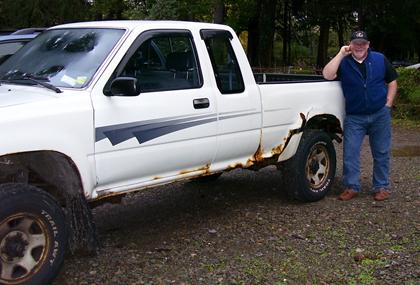By Tom Torbjornsen
Dear Tom,
I own a ’99 Chevy 1500 Suburban 4×4 with 102,000 miles. There is a whining sound coming from the rear when driving 55 to 65 mph. I had all the bearings replaced, and the ring and pinion gears show normal wear. Any suggestions?
Thanks,
Eddie from Miami
Eddie,
You failed to mention the rear pinion bearing. Have the lash and the up and down play checked for wear. Also, check the tire wear pattern on the rear tires. They could be cupped, which could also cause the whining.
Tom
Want a little cheese with that whine? (Just a little bad humor here.) On to Eddie’s question in detail.
What causes whining?
Whining can be caused by worn transmission or differential bearings or races (the surface the bearing rides on), a worn power steering or front transmission oil pump. A simple thorough inspection of the transmission, differential and power steering system will reveal if there are any bad bearings.
Cupped tires can also cause whining. When tires are left unattended the balance goes out resulting in wheel tramp. In this condition, the heavy spot in the tire gains inertia as it spins causing the tire/wheel to bounce as it spins down the road. The tires develop a cupped tread wear pattern from this bouncing (or tramping). Ultimately it results in a whine. Sometimes rotating and rebalancing the tires will correct the whining problem over time.
Another cause of whining
Worn differential lubricant is another cause of whining. Some carmakers have come out with semi-synthetic gear lubricants that have a specific life and need to be changed according to schedule. If left in too long, they lose their lubricating properties and heat, friction and whining ensue in the differential. Major gear damage will occur if left in too long.
Mechanically, the truck is fine. You’ve rotated the tires, but still have the whine. Now what?
If you are sure the transmission, differential and power steering are fine and you rotated the tires, it may be time to replace the tires if the noise is too much for you. Some tires have such an aggressive tread lug design that they simply cannot be quieted, so it may be time to buy a tire with a less aggressive tread. Light truck tires tend to be made of a stiffer, heavier rubber compound that lasts longer and is durable.
However, the downside is that they are noisy and offer stiff ride characteristics. A less aggressive tread design in an all-season or highway tire might be the ticket for you. But there are tradeoffs in making this move. Specifically, these types of tires don’t last as long as the heavy-duty truck tires, although they are much quieter and deliver a nicer ride. It is an individual’s decision. How much noise can you tolerate?
’Til next time … keep rollin’.




